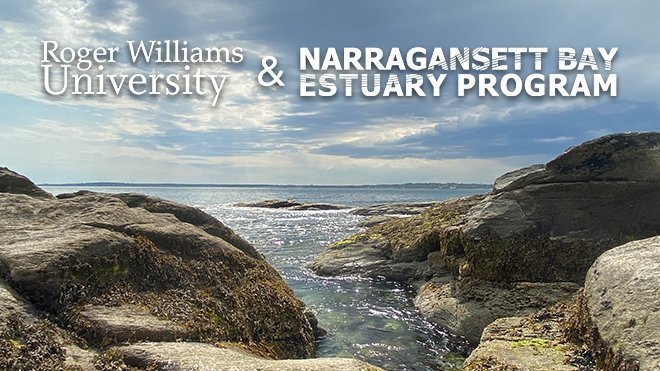Roger Williams University and Narragansett Bay Estuary Program Receive $1.1 Million Federal Award to Fund Watershed Protection Projects
RWU-NBEP partnered projects enable preservation, restoration and improvement of R.I.’s waterways, estuaries and watersheds, as well as student internships to address coastal resiliency

BRISTOL, RI – In an effort to protect Narragansett Bay, promote environmental stewardship, and enhance coastal resiliency and the blue economy, U.S. Senators Jack Reed and Sheldon Whitehouse and U.S. Representative Seth Magaziner today announced $1.1 million in federal funding for Roger Williams University to continue working with the Narragansett Bay Estuary Program (NBEP) on issues pertaining to coastal ecosystems.
The federal funds flow to Rhode Island under the National Estuary Program, which is a network of 28 place-based organizations working to restore “estuaries of national significance” around the United States. The Narragansett Bay Estuary Program activates a 30-member partnership of government, academic, scientific, and conservation organizations for the preservation, protection, restoration, and improvement of Narragansett Bay, Little Narragansett Bay, the Rhode Island Coastal Ponds, and their vast watersheds.
This new award brings the total granted to NBEP in FY23 to more than $2 million, from the Bipartisan Infrastructure Law, the Southeast New England Program (SNEP), and Senator Whitehouse’s Protect and Restore America's Estuaries Act. Senator Reed spearheaded the creation of SNEP as a senior member of the Senate Appropriations Committee, and Whitehouse’s law nearly doubled the program’s authorization to $50 million per year annually for 2022 through 2026 to help protect 28 individual estuaries and watersheds in the United States.
The federal funds may be used to further planning, research, and outreach for programs that engage local communities on issues such as wildlife and habitat restoration, water quality, storm protection and rising sea levels.
“The strong community partnership between Roger Williams University and the Narragansett Bay Estuary Program is paying dividends for our coastal communities and improving the health of our waters. I commend Senator Whitehouse for his leadership in protecting not only Narragansett Bay, but estuaries and ecosystems nationwide. This new funding will advance ecological research here in Rhode Island and help protect our wildlife and wetlands for years to come,” said Senator Reed.
“The Ocean State’s Narragansett Bay estuary plays a major role in our economy and daily lives,” said Senator Whitehouse, who sponsors a National Estuaries Week resolution in the Senate every year. “I worked to nearly double funding for the National Estuary Program, and a good chunk of that is coming to Rhode Island to protect Narragansett Bay. I want to thank Roger Williams University and the Narragansett Bay Estuary Program for their continued partnership in keeping the Bay clean and safeguarding fragile coastal wetlands.”
“Rhode Island’s estuaries, waterways, and watersheds are part of our state’s natural heritage and we must fight to preserve these habitats for future generations to enjoy,” said Rep. Seth Magaziner. “This federal funding will help protect Narragansett Bay, foster healthy ecosystems, and promote conservation efforts for coastal communities.”
“As Rhode Island positions itself as a center for the growing blue economy, Roger Williams University is leading the initiatives and research that prioritize ecosystem health and coastal resiliency,” said RWU President Ioannis N. Miaoulis. “With the support from Sen. Reed, Sen. Whitehouse and Rep. Magaziner, and RWU’s collaborative partnership that includes student internships to address these critical environmental and social justice issues, the Narragansett Bay Estuary Program will continue its important work to protect the Narragansett Bay ecosystem and improve the quality of life and natural resources for our communities.”
“Federal funding, alongside a strong partnership with our host, Roger Williams University, empowers NBEP to catalyze, facilitate, and fund scientific inquiry and collective action to restore and protect the Narragansett Bay region’s water quality, wildlife, and quality of life,” said Darcy Young, Interim Executive Director of NBEP. “Our work spans boundaries to communicate science, convene interests, and fund planning for projects that will sustain natural environments and healthy communities.”
The partnership between RWU and NBEP serves as a channel for federal funding for watershed projects that help address the consequences of water pollution, climate change, and environmental inequities. The organization seeks to bring diverse organizations together from across boundaries to build consensus around complex environmental challenges. NBEP has funded over 150 scientific studies and shared data on the health of the Bay with policymakers to ensure data-driven solutions to pressing challenges.
NBEP’s recent accomplishments include:
- Creating a long-term plan to improve the Blackstone River, the second largest tributary to Narragansett Bay that runs from Worcester, Massachusetts, to Pawtucket, Rhode Island.
- Funding much-needed capacity in local organizations that have the agency to effect positive environmental change in underserved communities.
- Initiating a stormwater master plan for Mt. Hope High School in Bristol.
- Documenting the positive impact of recent reductions in the discharge of nutrient pollution from wastewater treatment facilities is having on Narragansett Bay.
- Restoring over 7,500 acres of vital habitat in the Narragansett Bay region since 2006.